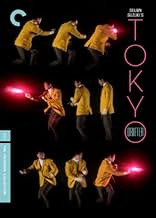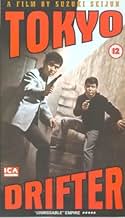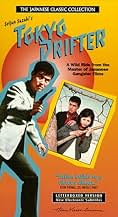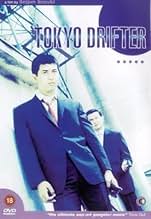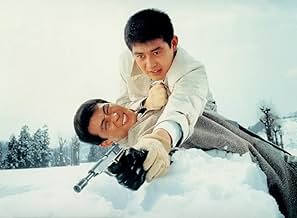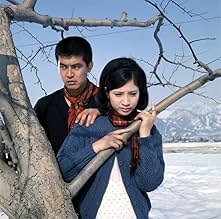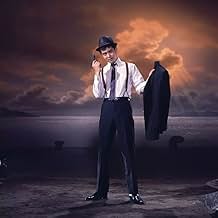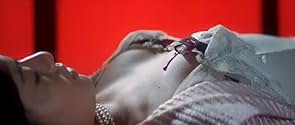IMDb-BEWERTUNG
7,1/10
10.186
IHRE BEWERTUNG
Füge eine Handlung in deiner Sprache hinzuAfter his gang disbands, a yakuza enforcer looks forward to life outside of organized crime but soon must become a drifter after his old rivals attempt to assassinate him.After his gang disbands, a yakuza enforcer looks forward to life outside of organized crime but soon must become a drifter after his old rivals attempt to assassinate him.After his gang disbands, a yakuza enforcer looks forward to life outside of organized crime but soon must become a drifter after his old rivals attempt to assassinate him.
Tamio Kawaji
- Tatsuzo, The Viper
- (as Tamio Kawachi)
Empfohlene Bewertungen
"Tokyo Drifter" is my introduction to the cinematic work of director Seijun Suzuki and it made quite a big impression. This is by far one of the most visually unique movies I have ever seen and the fact that it was made in 1966 makes it even more impressive.
Tetsuya played by Tetsuya Watari is a yakuza who has joined his boss Kurato (Ryuji Kita) in going straight. Unfortunately for both of them a rival gang begins threatening Kurato's legitimate business. After a brief confrontation Tetsuya is forced to leave his boss that way he would hopefully relieve the pressure between Kurato and the gang. Things don't go as smoothly as Tetsuya planned and he finds himself chased by gangs all over Japan.
The story is standard fare yakuza tale. With a hefty doze of betrayal, inner power struggles and a bit of melodrama in the form of Tetsuya's girlfriend. We've seen it all before. Now. What really sets this movie apart from any other is it's unique visual nearly surrealistic style. Suziki employs several tricks in order to assure that the film will remain distant from any other. His use of colors creates one part of the that. More accurately his use of color contrast, we see that in several scenes through the movie, for example during the final shootout we see gang members dressed in primarily black suits while the location itself was in mainly white bright colors. Tetsuya himself is often dressed in colors that merge him with the backgrounds further helping in the creation of the film's extravagant look. The second aspect of the movie's uniqueness is the camera work and the overall directing. Suziki employs techniques that are reminiscene of western movies and more specifically Sergio Leone's line of work. The final shootout again serves as a great example of that.
The acting is on par with the script, characters are well played by their respective actors. They don't make an overly big impression but certainly don't deteriorate the quality. The film has a good music score with a particularly memorable theme song by the main actor Tetsuya Watari that is always nice to hear and fit's very well with the mood.
"Tokyo Drifter" is a movie that offers stunning visuals and a plot that while not very deep in characterization is still able to carry the film's unique style. Mister Suzuki is able to impress, sadly his production company at the time wasn't on the same opinion and soon after he was fired and blacklisted for 10 years. A real shame for a director with such talent.
Tetsuya played by Tetsuya Watari is a yakuza who has joined his boss Kurato (Ryuji Kita) in going straight. Unfortunately for both of them a rival gang begins threatening Kurato's legitimate business. After a brief confrontation Tetsuya is forced to leave his boss that way he would hopefully relieve the pressure between Kurato and the gang. Things don't go as smoothly as Tetsuya planned and he finds himself chased by gangs all over Japan.
The story is standard fare yakuza tale. With a hefty doze of betrayal, inner power struggles and a bit of melodrama in the form of Tetsuya's girlfriend. We've seen it all before. Now. What really sets this movie apart from any other is it's unique visual nearly surrealistic style. Suziki employs several tricks in order to assure that the film will remain distant from any other. His use of colors creates one part of the that. More accurately his use of color contrast, we see that in several scenes through the movie, for example during the final shootout we see gang members dressed in primarily black suits while the location itself was in mainly white bright colors. Tetsuya himself is often dressed in colors that merge him with the backgrounds further helping in the creation of the film's extravagant look. The second aspect of the movie's uniqueness is the camera work and the overall directing. Suziki employs techniques that are reminiscene of western movies and more specifically Sergio Leone's line of work. The final shootout again serves as a great example of that.
The acting is on par with the script, characters are well played by their respective actors. They don't make an overly big impression but certainly don't deteriorate the quality. The film has a good music score with a particularly memorable theme song by the main actor Tetsuya Watari that is always nice to hear and fit's very well with the mood.
"Tokyo Drifter" is a movie that offers stunning visuals and a plot that while not very deep in characterization is still able to carry the film's unique style. Mister Suzuki is able to impress, sadly his production company at the time wasn't on the same opinion and soon after he was fired and blacklisted for 10 years. A real shame for a director with such talent.
I will argue until my death that TOKYO DRIFTER is superior to BRANDED TO KILL, but that's for another time...
I am amazed every time I see this film that Suzuki could take such an obviously inferior product -- as Nikkatsu Studios was churning out at an obscene rate in those days, giving directors a script and saying "Shoot it fast and cheap so we can give you your next job" -- and turn it into one of the most beautiful and intriguing films I've ever seen.
Best plot ever? No. Easy to follow? Yes. Beautiful? Yes. And that theme...I could never forget that theme if I tried, even after my first viewing.
I'd ramble on about history and plot and so on, but so many others have, I'll just leave it at this: TOKYO DRIFTER makes me happy every time I see it.
I am amazed every time I see this film that Suzuki could take such an obviously inferior product -- as Nikkatsu Studios was churning out at an obscene rate in those days, giving directors a script and saying "Shoot it fast and cheap so we can give you your next job" -- and turn it into one of the most beautiful and intriguing films I've ever seen.
Best plot ever? No. Easy to follow? Yes. Beautiful? Yes. And that theme...I could never forget that theme if I tried, even after my first viewing.
I'd ramble on about history and plot and so on, but so many others have, I'll just leave it at this: TOKYO DRIFTER makes me happy every time I see it.
In 1966 Nikkatsu, a Japanese studio, requested that one of their more "difficult" directors "calm down" on his next project. The director was Seijun Suzuki. The project was Tokyo Drifter. The result was anything but calm.
A film-noir shot through with moments of brilliant, lurid colour; the film defies all conventions be it genre, style or even something as mundane and unnecessary as narrative. One scene finds Tetsuya Watari's pouting yakuza in a tense showdown with his rival. Standing on train tracks, surrounded by clean, crisp snow the screen is split in two by a clearly visible dark blue line. The use of this visual effect is telling. It adds nothing to the story, to the characterisation, it simply looks good.
The closing sequence has to be seen to be believed. It is best described as the secret lovechild of a Gene Kelly musical and a John Woo action film. Amazing.
If for nothing else, Tokyo Drifter will long be remembered for the theme tune which hauntingly drifts through the entire film.
A film-noir shot through with moments of brilliant, lurid colour; the film defies all conventions be it genre, style or even something as mundane and unnecessary as narrative. One scene finds Tetsuya Watari's pouting yakuza in a tense showdown with his rival. Standing on train tracks, surrounded by clean, crisp snow the screen is split in two by a clearly visible dark blue line. The use of this visual effect is telling. It adds nothing to the story, to the characterisation, it simply looks good.
The closing sequence has to be seen to be believed. It is best described as the secret lovechild of a Gene Kelly musical and a John Woo action film. Amazing.
If for nothing else, Tokyo Drifter will long be remembered for the theme tune which hauntingly drifts through the entire film.
Much of Tokyo Drifter (1966) requires a certain sense of cultural background and historical context in order to be better appreciated; otherwise, it most probably seems vapid, dated and entirely incoherent. You have to appreciate the fact that for the first part of his career, director Seijun Suzuki was a contract player for Nikkatsu Pictures, and largely obligated contractually to take any project offered to him, regardless of plot, concept or theme. He was also working under fairly strict conditions in order to produce the biggest financial turnover, whilst simultaneously striving to give his films a certain sense of character or individuality to make them stand out against the other, identikit youth films being produced by Nikkatsu at that particular time. By the mid-1960's he'd already begun to push his films further into more personal, idiosyncratic directions; experimenting with colour on Youth of the Beast (1963) and composition in The Story of a Prostitute (1965), as well as experimenting with more theatrical uses of lighting and location design on the classic Gate of Flesh (1964).
Most of these stylistic flourishes came from his interest in Kabuki theatre, with Suzuki transposing the artificial, ornate and entirely abstract world of those productions to the gritty and violent streets of his low-budget B-pictures. It is important to keep in mind also that these films were incredibly cheap to make and certainly not considered to be "prestige pictures". Think of the hundreds of other films being released by the same company at the same time and ask yourself why these films aren't getting the same kind of posthumous attention in the west. The real reason is the context. Suzuki transcended the limitations of what was required of his work; instilling it with a personal style and a larger than life sense of exuberance that resonates with anyone who can truly appreciate the magic and power of cinema. This is apparent right from the start of Tokyo Drifter, as a black and white sequence of betrayal sets up the mood of gritty violence, punctuated by stark abstraction. The scene is vague and enigmatic; choreographed in such a way as to suggest pastiche, but still managing to remain fairly brutal. Suzuki also wastes no time throwing us into this overly complicated narrative, in which the turf war between two rival Yakuza fractions spirals out of control and causes grief for a loyal young thug trying to do the right thing, whilst still attempting to remain faithful to his boss.
However, what is most remarkable about this scene, and about the film in general, is Suzuki's anarchic and unconventional approach to location and production design, as well as his fragmented bursts of editing and his masterful use of cinematography. The opening scene fools us into thinking that this will be another run of the mill, low-budget gang-thriller in gritty black and white. However, as the central character drops down on one knee to fire a succession of shots past the camera at an off-screen foe, we cut briefly to a shot of bold, dizzying colour. After the opening scene has played out, the film cuts to that catchy title song and the film switches to colour full time. This juxtaposition is a jarring one, and establishes the mood and tone that Suzuki had in mind for us, as the rest of the film continues these ideas of abstraction, exuberance and the utterly unconventional. The cinematography, design, editing and costumes are fantastic throughout, with Suzuki and his team using bold, primary colours that create an almost comic-strip like quality, whilst the use of theatrical lighting, camera movement and those epic, cinemascope compositions turn a backstreet battle for power into an epic parable of almost Shakespearian proportions.
If you're already familiar with Japanese Yakuza cinema, from the grittier, more hard-hitting films of Kinji Fukasaku, to the restless experimentations of Takashi Miike, or indeed, the unconventional gang cinema of Takeshi Kitano, then you'll already know what to expect from the presentation of character and theme established by Suzuki herein. So, we have loyalty, betrayal, power, corruption, brotherhood and retribution alongside the central notion of a once-violent character attempting to remove himself from a world that he can no longer understand. Obviously, given the conventions of the genre, he can never quite escape this world, and indeed, it is here where the conflict of the film will arise. However, such notions of story and character are sure to come secondary to the overwhelming power of Suzuki's images; which suggest, as one reviewer put it, "the spirit of a youthful Jean Luc Godard directing Point Blank (1967) from a script by Stan Lee".
Criticisms that Suzuki can't tell a coherent story are puerile and go against every notion of what cinema is and what cinema should attain to. You simply cannot judge a filmmaker off the strengths and weaknesses of a single film, especially one that already has a reputation as being one of his most radical and slyly anarchic. It's like dismissing the work of Takashi Miike after only having seen Fudoh: A New Generation (1996) or Dead or Alive (1999), or even dismissing Tarantino off the back of Death Proof (2007) or Kill Bill (2003). There are plenty of films from Suzuki in which the story is a primary concern; however, with Tokyo Drifter he was attempting something different, something more revolutionary. A pure slice of psychedelic 60's chic in the pop art tradition, with shoot-outs, fist fights, fragmented editing and some truly intoxicating colours.
Most of these stylistic flourishes came from his interest in Kabuki theatre, with Suzuki transposing the artificial, ornate and entirely abstract world of those productions to the gritty and violent streets of his low-budget B-pictures. It is important to keep in mind also that these films were incredibly cheap to make and certainly not considered to be "prestige pictures". Think of the hundreds of other films being released by the same company at the same time and ask yourself why these films aren't getting the same kind of posthumous attention in the west. The real reason is the context. Suzuki transcended the limitations of what was required of his work; instilling it with a personal style and a larger than life sense of exuberance that resonates with anyone who can truly appreciate the magic and power of cinema. This is apparent right from the start of Tokyo Drifter, as a black and white sequence of betrayal sets up the mood of gritty violence, punctuated by stark abstraction. The scene is vague and enigmatic; choreographed in such a way as to suggest pastiche, but still managing to remain fairly brutal. Suzuki also wastes no time throwing us into this overly complicated narrative, in which the turf war between two rival Yakuza fractions spirals out of control and causes grief for a loyal young thug trying to do the right thing, whilst still attempting to remain faithful to his boss.
However, what is most remarkable about this scene, and about the film in general, is Suzuki's anarchic and unconventional approach to location and production design, as well as his fragmented bursts of editing and his masterful use of cinematography. The opening scene fools us into thinking that this will be another run of the mill, low-budget gang-thriller in gritty black and white. However, as the central character drops down on one knee to fire a succession of shots past the camera at an off-screen foe, we cut briefly to a shot of bold, dizzying colour. After the opening scene has played out, the film cuts to that catchy title song and the film switches to colour full time. This juxtaposition is a jarring one, and establishes the mood and tone that Suzuki had in mind for us, as the rest of the film continues these ideas of abstraction, exuberance and the utterly unconventional. The cinematography, design, editing and costumes are fantastic throughout, with Suzuki and his team using bold, primary colours that create an almost comic-strip like quality, whilst the use of theatrical lighting, camera movement and those epic, cinemascope compositions turn a backstreet battle for power into an epic parable of almost Shakespearian proportions.
If you're already familiar with Japanese Yakuza cinema, from the grittier, more hard-hitting films of Kinji Fukasaku, to the restless experimentations of Takashi Miike, or indeed, the unconventional gang cinema of Takeshi Kitano, then you'll already know what to expect from the presentation of character and theme established by Suzuki herein. So, we have loyalty, betrayal, power, corruption, brotherhood and retribution alongside the central notion of a once-violent character attempting to remove himself from a world that he can no longer understand. Obviously, given the conventions of the genre, he can never quite escape this world, and indeed, it is here where the conflict of the film will arise. However, such notions of story and character are sure to come secondary to the overwhelming power of Suzuki's images; which suggest, as one reviewer put it, "the spirit of a youthful Jean Luc Godard directing Point Blank (1967) from a script by Stan Lee".
Criticisms that Suzuki can't tell a coherent story are puerile and go against every notion of what cinema is and what cinema should attain to. You simply cannot judge a filmmaker off the strengths and weaknesses of a single film, especially one that already has a reputation as being one of his most radical and slyly anarchic. It's like dismissing the work of Takashi Miike after only having seen Fudoh: A New Generation (1996) or Dead or Alive (1999), or even dismissing Tarantino off the back of Death Proof (2007) or Kill Bill (2003). There are plenty of films from Suzuki in which the story is a primary concern; however, with Tokyo Drifter he was attempting something different, something more revolutionary. A pure slice of psychedelic 60's chic in the pop art tradition, with shoot-outs, fist fights, fragmented editing and some truly intoxicating colours.
If you are fed up by ordinary manufactured campiness, but still have normal levels of humor.. Which is to say if you find Austin Powers not only boring but trivial, you might check this out. It is high camp. It is ridiculous in ways that in other action films we readily accept: think the recent James Bonds. There is a joke product placement — for hair driers — that is really funny.
We have the ordinary sort of thing that qualifies: cheesy songs, goofy hero, posed action, jingly hipness. But we have a level of cheesiness that goes beyond the Tarrantino level, beyond the usual joke. The cinematography is one big joke, one that still works today because the big movies still use Vietnam era visual devices.
We have jokes on Bertralucci, Welles, Kurosawa. Leone of course. We have a couple stagings from Bergman even. It is not worth the effort to single out any Frenchman it seems, treating them with the contempt of wholesale dismissal.
Under ordinary circumstances, I would not recommend this because the usual level of the joke gets pretty tiring after 20-30 minutes. But the cinematic jokes and references keep coming, as though there were a catalogue (like we are told the Coen brothers keep). The blatant vacancy of the visuals is pretty damning.
Ted's Evaluation -- 2 of 3: Has some interesting elements.
We have the ordinary sort of thing that qualifies: cheesy songs, goofy hero, posed action, jingly hipness. But we have a level of cheesiness that goes beyond the Tarrantino level, beyond the usual joke. The cinematography is one big joke, one that still works today because the big movies still use Vietnam era visual devices.
We have jokes on Bertralucci, Welles, Kurosawa. Leone of course. We have a couple stagings from Bergman even. It is not worth the effort to single out any Frenchman it seems, treating them with the contempt of wholesale dismissal.
Under ordinary circumstances, I would not recommend this because the usual level of the joke gets pretty tiring after 20-30 minutes. But the cinematic jokes and references keep coming, as though there were a catalogue (like we are told the Coen brothers keep). The blatant vacancy of the visuals is pretty damning.
Ted's Evaluation -- 2 of 3: Has some interesting elements.
Wusstest du schon
- WissenswertesWas shot and edited in 28 days.
- Zitate
Tetsuya 'Phoenix Tetsu' Hondo: A drifter needs no woman.
- VerbindungenFeatured in Seijun Suzuki | TCM (2013)
Top-Auswahl
Melde dich zum Bewerten an und greife auf die Watchlist für personalisierte Empfehlungen zu.
- How long is Tokyo Drifter?Powered by Alexa
Details
Box Office
- Weltweiter Bruttoertrag
- 755 $
- Laufzeit1 Stunde 22 Minuten
- Farbe
- Sound-Mix
- Seitenverhältnis
- 2.35 : 1
Zu dieser Seite beitragen
Bearbeitung vorschlagen oder fehlenden Inhalt hinzufügen

Oberste Lücke
What is the German language plot outline for Tokyo Drifter - Der Mann aus Tokio (1966)?
Antwort
